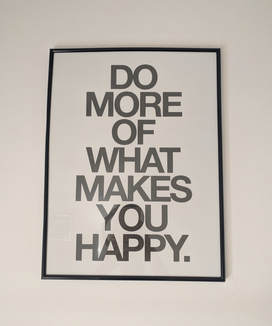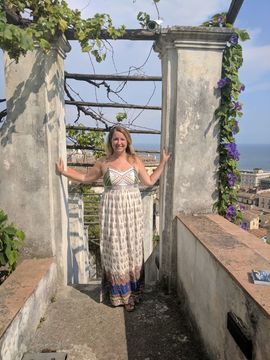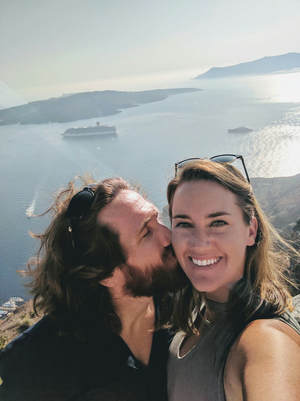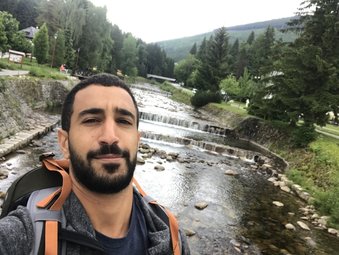 I wrote this post while staring at this picture that someone hung in my apartment in Croatia. It seems apt. I wrote this post while staring at this picture that someone hung in my apartment in Croatia. It seems apt. When I initially thought of the idea for the “When I Was 17” project, I had a hypothesis that the pressure today’s students feel to choose a major at 17 that would lead to a clear career that you could do for decades and decades was unreasonable. I believed that, for most people, the path to their career was more like the Road to Hana than Eyre Highway (Australia’s longest straight road – look it up!). After 15 interviews, that idea has mostly born out. But a few other things have become clear too. 1. Some people do know exactly what they want to do when they grow up. Talking to people like Melissa Smith and Dvir Hazout, I was so struck by the fact that they did actually know what they wanted to do for their careers. And they went out and did it – and they love it. But even when you know what you want to do, there are still scores of variables to consider: where you want to work, whether to work for yourself or someone else, what kind of company or industry you want to work for. Those variables have made Melissa’s and Dvir’s career paths unique, even from other people who do the same jobs. Even when you know what you want to do, there are still choices to be made and moments of uncertainty. 2. It’s never too late to change direction. Part of what makes this decision feel so stressful is the idea that you can’t change your mind. But one of the things Jessica Fradono emphasized in her interview is that you can always start down a new path – even 20 years in. She made several moves in her career, from psychology to hospitality, from hospitality to human resources, and most recently (and dramatically) from HR to photography. Even when it’s difficult, even when it means letting go of something good, you can always go back to school or learn a new skill and start over. And chances are, the experience you’ve acquired up to that point will actually benefit you in your next career. 3. Some of it just comes down to luck. One of the things that makes people nervous about pursuing a humanities degree is how abstract it seems. No one would deny the value of strong writing and critical thinking skills, but the lack of a clear line from diploma to profession can feel paralyzing. Where do you even start? For people like Sari Abdo and myself, the path from graduation to first job was almost random. We applied to a broad range of openings and chose an entry-level job with a company we liked; for Sari it was marketing at a startup, for me it was higher education administration at Stanford University. That initial decision pointed us down the paths we’ve continued to follow to the present day. If I had gotten a job at a different company, or even in a different department at Stanford, I might have gone in a totally different direction. 4. Your dream job might not exist yet. Open any issue of Harvard Business Review or Forbes and you’ll see a discussion of how rapidly the professional landscape is shifting. Entire industries are now reliant on technologies that didn’t exist five years ago. And we have to be reminded that jobs that seem commonplace – web development, UX design, social media marketing – are actually fairly recent inventions. So how can you possibly choose a major that will lead to a job you’ve never heard of? Phil Belleau is a great example of someone who worked to develop a diverse set of skills that could be applied to many jobs. And when he found a position that was a combination of those things, he was able to articulate what made him a good fit for this brand new role. By staying open, he was actually better prepared than if he had honed in on one professional trajectory. 5. Sometimes your work and your passion are two different things. We’ve all heard the adage, “Do something you love and you’ll never work a day in your life.” I can whole-heartedly say that I love being a college counselor, but it still feels like work – especially compared to reading books and drinking piña coladas in Maui. Work can be an extension of your life’s purpose. I think many of us at Collegewise would characterize their jobs as such. But work can also be the thing that enables you to do the other things that you love. Many of my fellow Roamers have really come to value the flexibility their jobs allow them, particularly to travel and work remotely this year. And some of them are starting to prioritize that in a whole new way as they consider their next professional moves. So instead of asking yourself, “What do I want to do for a living?” ask, “What kind of life do I want to live?” And then build a career that works for that.
0 Comments
 On week two of what was meant to be a three-day jaunt to Italy, Jessica's spirit destination. On week two of what was meant to be a three-day jaunt to Italy, Jessica's spirit destination. Jessica Fradono is a freelance photographer, using her time on We Roam to capture the authentic beauty (#nofilter) of the people, vistas, and food she's encountering around the world. Photography is very much a second act for Jessica, who started her career in hospitality and human resources, but there are more than a few intersections between her first profession and her current one. Our conversation has been edited for length and clarity. When you were 17, what did you want to be? It’s funny because, when I was in high school, I was really heavily into journalism and it’s something I really wanted to do, and I was pushed away from it because it’s such a hard industry and it’s difficult to make a great living. I was part of the school newspaper, and I was the main editorial writer. I also oversaw the layout of the paper, and back then we didn’t have the computer luxury, so it was a lot of doing things manually.  Amy's next business venture is going to be bottling and selling that travel glow. Amy's next business venture is going to be bottling and selling that travel glow. Amy Bukovich is not what comes to mind when you picture an accountant (recent Ben Affleck films aside). Loquacious and laid-back with a bone-dry sense of humor, Amy is much more the embodiment of her so-called “first career” as a college softball player. Her path has taken turns through a pre-med major, her first job at a company run by an Orthodox Jewish family, and a move that unexpectedly landed her a remote job as the CFO at Search Wizards. Our conversation has been edited for length and clarity. When you were 17, what did you want to be? At 17, I had actually been working in a doctor’s office. I was on the pre-med track, so I was getting to work in a pediatric/plastic surgeon’s office, a husband/wife duo. I’d go and sit in the consultation rooms for pediatrics, I sat in consultations for plastic surgery. I didn’t want to be either of those, but it kind of gives you what to expect a little bit.  It's hard to tell from his expression, but Dvir actually enjoys being out in nature. It's hard to tell from his expression, but Dvir actually enjoys being out in nature. Dvir Hazout is a full-stack developer at Kaltura, working on video streaming platforms for companies like Vodaphone, although it sometimes looks like he’s just watching The Lion King. Dvir is a rare example of someone who knew exactly what he wanted to do when he was a teenager – so much so that he just started doing it at age 15. Even so, he’s found unexpected opportunities that led him to his present job, and he’s by no means done evolving professionally. Our conversation has been edited for length and clarity. When you were 17, what did you want to be? So, at the age of 16, even before, I was very passionate about designing and coding. I taught it to myself from age 13, [using the] Internet, Google was the main place. I took some video courses, and I also learned English better that way than I did in school, because in school you study grammar and stuff like that. But when you watch video courses, and you’re constantly reading English and writing English, you get to learn English much better. So I took a lot of video courses in specific subjects that I wanted to learn about. It was really clear for me from a very early age that I wanted to be in this industry, a programmer, a designer, or a combination of both. So that’s what I did. At a very early age, I started to work as a freelancer. My first real, paying job as a freelancer was at age 15. |
What is the When I Was 17 Project?When I Was 17 is a blog series dedicated to collecting the varied stories of people's career paths, what they envisioned themselves doing when they were teenagers and how that evolved over the course of their lives. I started this project with the goal of illustrating that it's okay not to know exactly what you want to do when you're 17; many successful people didn't, and these are a few of their stories.
Archives
October 2020
|